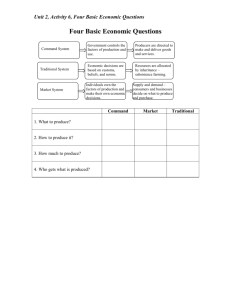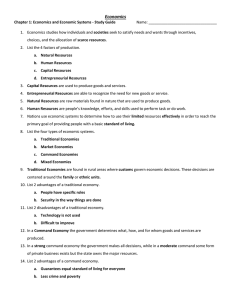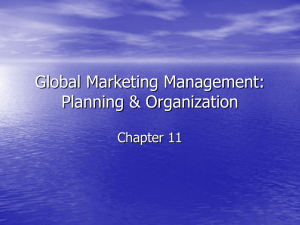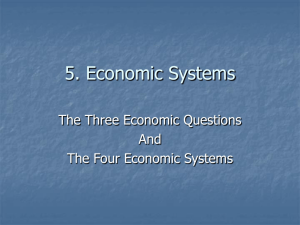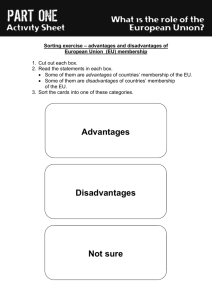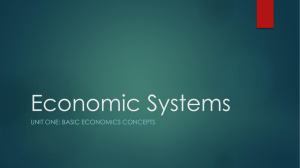File
advertisement
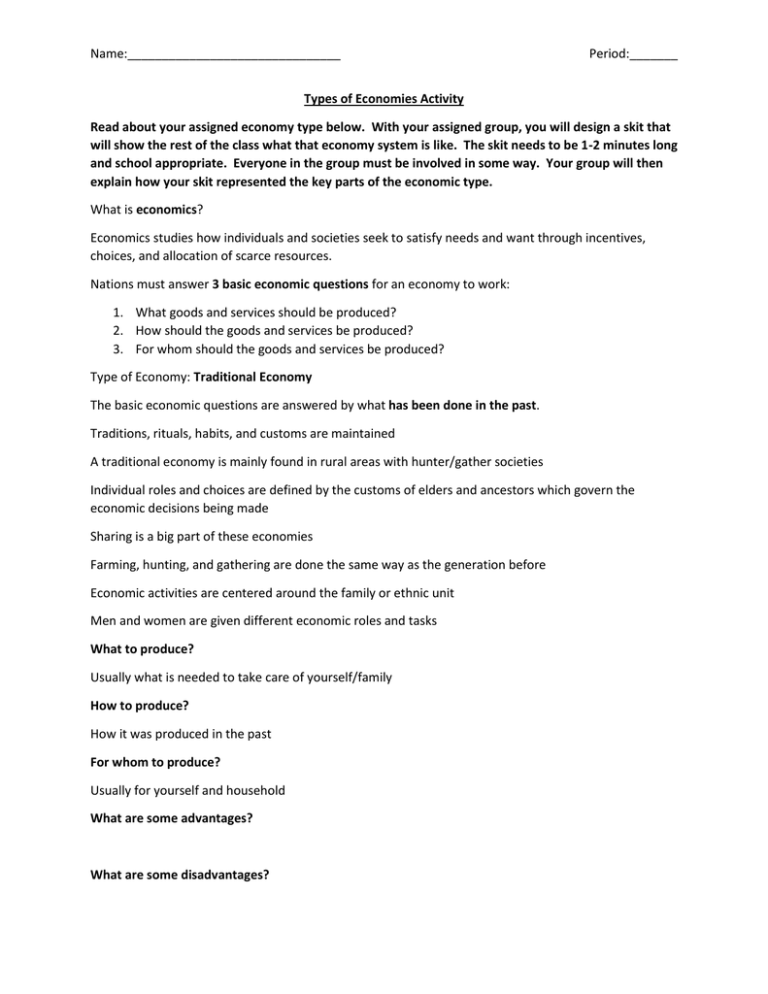
Name:_______________________________ Period:_______ Types of Economies Activity Read about your assigned economy type below. With your assigned group, you will design a skit that will show the rest of the class what that economy system is like. The skit needs to be 1-2 minutes long and school appropriate. Everyone in the group must be involved in some way. Your group will then explain how your skit represented the key parts of the economic type. What is economics? Economics studies how individuals and societies seek to satisfy needs and want through incentives, choices, and allocation of scarce resources. Nations must answer 3 basic economic questions for an economy to work: 1. What goods and services should be produced? 2. How should the goods and services be produced? 3. For whom should the goods and services be produced? Type of Economy: Traditional Economy The basic economic questions are answered by what has been done in the past. Traditions, rituals, habits, and customs are maintained A traditional economy is mainly found in rural areas with hunter/gather societies Individual roles and choices are defined by the customs of elders and ancestors which govern the economic decisions being made Sharing is a big part of these economies Farming, hunting, and gathering are done the same way as the generation before Economic activities are centered around the family or ethnic unit Men and women are given different economic roles and tasks What to produce? Usually what is needed to take care of yourself/family How to produce? How it was produced in the past For whom to produce? Usually for yourself and household What are some advantages? What are some disadvantages? Name:_______________________________ Period:_______ Nations must answer 3 basic economic questions for an economy to work: 1. What goods and services should be produced? 2. How should the goods and services be produced? 3. For whom should the goods and services be produced? Type of Economy: Command Economy The basic economic questions are answered by the government or central authority. They make all decisions and determine how resources will be used. There is little individual freedom There is no competition Businesses are not run to create a profit Consumers have few choices in the market place Government dictates the job in which you work Government sets the prices of goods and services Factories are concerned with meeting quotas (a daily/weekly/monthly/yearly goal) What to produce? What the government says to produce How to produce? How the government decides as they own all factories For whom to produce? For whomever the government tells you to produce (ideally the entire society) What are some advantages? What are some disadvantages? Name:_______________________________ Period:_______ Nations must answer 3 basic economic questions for an economy to work: 1. What goods and services should be produced? 2. How should the goods and services be produced? 3. For whom should the goods and services be produced? Type of Economy: Pure Market Economy The basic economic questions are answered by the people. There is no government involvement in any economic decisions. Also called a Free Market Economy Businesses and consumers decide what they will produce and purchase and in what quantities Decisions are made according to the law of supply and demand Supply and demand of goods and services determines what is produced and how much things cost There is no Pure Market Economy anywhere in the world What to produce? Customers decide this through what they purchase How to produce? Individual businesses decide on this, but businesses must be profitable For whom to produce? For people who have money and can buy more What are some advantages? What are some disadvantages? Name:_______________________________ Period:_______ Nations must answer 3 basic economic questions for an economy to work: 1. What goods and services should be produced? 2. How should the goods and services be produced? 3. For whom should the goods and services be produced? Type of Economy: Mixed Economy A combination of a market and a command economy in which the government takes care of people’s needs while the marketplace takes care of people’s wants. Government and individuals share the decision making process Government guides and regulates production of goods and services offered Individuals own means of production Protects consumers and workers from unfair policies Most effective economy for providing a range of goods and services Some government involvement through mandatory laws and regulations that businesses follow (labor laws, minimum wage, etc.) The government provides social programs for those who need help (medicare, welfare, etc.) All economies (except North Korea) are mixed. They are classified based on how much the government is involved in the process What to produce? The people can decide what they want to produce, as long as the government does not already provide it. How to produce? However the people decide they want to produce, as long as it follows government regulations. For whom to produce? For whomever is willing to buy. What are some advantages? What are some disadvantages?
